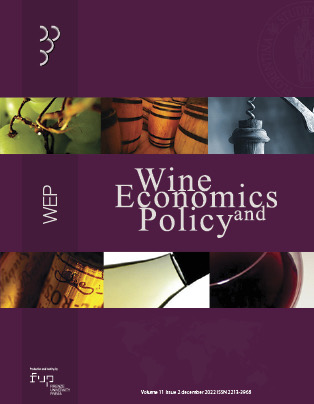Published 2022-11-17
Keywords
- reputation,
- wine,
- experts ratings,
- sentiment analysis,
- finite mixture model
- wine guides ...More
How to Cite
Copyright (c) 2022 Gabriel I. Penagos-Londoño, Felipe Ruiz-Moreno, Ricardo Sellers-Rubio, Salvador Del Barrio-García, Ana B. Casado-Díaz

This work is licensed under a Creative Commons Attribution 4.0 International License.
Abstract
Purpose. The purpose of this study is to examine the internal consistency of wine guides by comparing the judgements of expert wine tasters and reviewers. A classification of wines is provided to establish whether expert reviews of similar wines are coherent. Design/methodology/approach. Sentiment analysis based on natural language processing techniques was used to compare quantitative and qualitative reviews between experts. In addition, a finite mixture model was used to classify wines into categories to analyse internal consistency between ratings. Findings. The results for a sample of more than 200,000 Wine Enthusiast ratings reveal significant differences between expert reviews. This finding indicates that there are no standard criteria for reviewing wines included in the guide. Originality. Wine guides are amongst the most widely used marketing resources in the wine industry. They provide a signal to consumers about the quality of wines, guiding their purchase decisions. They also influence the reputation of brands and the performance of companies producing these wines. The main contribution of this study is to propose a new way to compare the reviews of wine guide experts.

